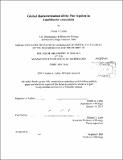Global characterization of the Pho regulon in Caulobacter crescentus
Author(s)
Lubin, Emma A. (Emma Alexandra)
DownloadFull printable version (16.34Mb)
Other Contributors
Massachusetts Institute of Technology. Department of Biology.
Advisor
Michael T. Laub.
Terms of use
Metadata
Show full item recordAbstract
Bacteria must sense and respond to their environment in order to survive and proliferate. Adapting to phosphate-limited conditions is particularly critical, as phosphate is a central component of many important biomolecules. Most bacteria respond to phosphate limitation through a widely conserved pathway, composed of the phosphate transport Pst system, and downstream signal transduction pathway, PhoR-PhoB, termed the Pho system. In this thesis, I use the model organism Caulobacter crescentus to characterize the response to phosphate limitation. I use ChIP-Seq on the transcriptional regulator PhoB to globally map the Pho regulon in Caulobacter in both phosphate-starved and -replete conditions. I find that the regulatory regions of over 50 genes are bound by PhoB following phosphate limitation, and I identify a consensus PhoB binding motif in Caulobacter. I then examine the function of PhoU, which is a putative negative regulator of the Pho regulon in Caulobacter and many other bacteria. I use morphological and microarray data to demonstrate that PhoU is not a negative regulator of the Pho regulon, and that it instead acts outside the PhoR-PhoB pathway. I find that the function of PhoU is tightly linked to cellular phosphate metabolism. This work offers insight into how Caulobacter responds to nutrient stress, as well as a better understanding of the connectivity and output of the phosphate limitation response pathway.
Description
Thesis: Ph. D., Massachusetts Institute of Technology, Department of Biology, 2014. Cataloged from PDF version of thesis. Includes bibliographical references.
Date issued
2014Department
Massachusetts Institute of Technology. Department of BiologyPublisher
Massachusetts Institute of Technology
Keywords
Biology.